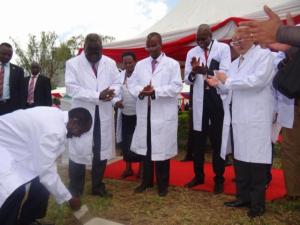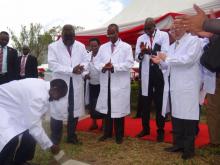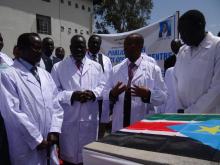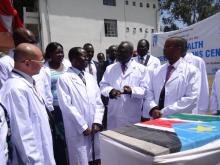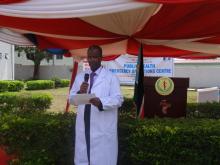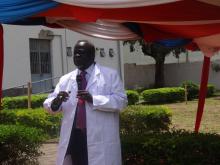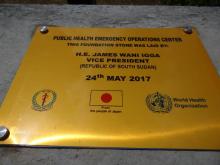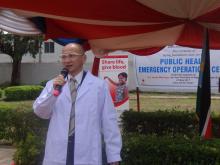Japan and WHO to establish the first Public Health Emergency Operations Centre in Juba, South Sudan
24 May 2017, Juba, South Sudan – The Government of Japan and the World Health Organization (WHO) are to establish the first Public Health Emergency Operations Centre (PHEOC) in Juba. The USD 0.45 million project that comprises PHEOC’s infrastructure and equipment comes on top of Japan’s multi-year contribution to scaling up of blood transfusion services. The objective of establishing the PHEOC is to strengthen preparedness and response capacities for public health emergencies in line with the International Health Regulations of 2005.
The groundbreaking ceremony on 24 May 2017 was presided over by Vice President of the Republic of South Sudan, H.E. James Wani Igga.
In his opening remarks, Minister of Health, the Honourable Dr Riek Gai Kok, highlighted the tremendous, ongoing effort of the Government of South Sudan, facilitated by the contributions of the Government of Japan and the commitments of WHO to prevent, detect, and control disease outbreaks in South Sudan.
South Sudan continues to experience recurrent epidemic-prone diseases and other public health and humanitarian emergencies. In 2016 alone, South Sudan Epidemic Preparedness and Response team received 223 unverified reports of unusual events of public health importance. In 2017, from January to date, 128 events were reported and 84% of them were verified and investigated within 48 hours.
“The implementation of PHEOC greatly improves the multi-agency coordination and improves operations efficiency through information sharing and joint decision-making,” says Dr Abdulmumini Usman, WHO Country Representative to South Sudan. “PHEOCs are an important tool for the strategic management of public health emergencies to ensure global health security.”
In addition to the establishment of the PHEOC, since 2015, the Government of Japan, through WHO, has allocated USD 4.6 million to support overall humanitarian response including the blood transfusion safety, provision of lifesaving emergency medicines and supplies, strengthening disease surveillance and outbreak response as well as training of community health workers on communicable disease control. The Government of Japan’s new commitment in March 2017 crystallizes the previous efforts in the form of an emergency operations centre with a capacity to cope contagious disease control tasks with enough trained personnel and analytical equipment.
”Today we lay a milestone in the history of secondary healthcare in South Sudan, warranting Ministry of Health’s services to the nation that has suffered far too long with recurrent disease outbreaks without proper containing methods, facilities, or analytical capacity. With essential trained healthcare providers and advanced equipment financed by Japan, PHEOC, when operationalized by the end of the year, will uplift the minds of the South Sudanese people who have otherwise been plagued by fear that failing to afford basic healthcare services would automatically risk mortality. We believe in enhancing Human Security of South Sudan through secondary healthcare development,” says Ambassador of Japan to South Sudan, H.E. Kiya Masahiko.
A public health emergency operations centre is a hub that brings together, under the umbrella of Ministry of Health, all relevant experts, groups and stakeholders involved in preparedness and response. Using an incident management system, the PHEOC promotes structured collaboration and communication, and generates real-time quality information for evidence-based decision-making.
“WHO appreciates the generous contribution of the Government of Japan in helping South Sudan’s emergency preparedness and response,” said Dr Usman. To effectively respond to events of public health concerns including disease outbreaks, WHO is committed to strengthening the nation’s ability to detect and respond to public health threats.
Also in attendance were Dr Makur Matur Kariom, Undersecretary of Health and all Directors-Generals under his command, the Honorable Minister of High Education, accompanied by SPLA Secretary of Foreign Affairs, Mr Shigeru Hamano, Deputy Chief of the Japanese Embassy in South Sudan, and relevant health sector development partners of the UN family.
_________________________________________
For more information, please contact the below:
Dr Allan Mpairwe, Health Security and Emergency Officer, Tel: +211 955 372 370, E-mail: mpairwea [at] who.int (mpairwea[at]who[dot]int) Mr Koji Ito, Development Cooperation, Embassy of Japan in South Sudan, Tel: +211 956 481 145, E-mail: koji.ito-2 [at] mofa.go.jp (koji[dot]ito-2[at]mofa[dot]go[dot]jp)
Below:
1. H.E. James Wani Igga laying the foundation stone
2. Dr Abdulmumini Usman, WHO Representative briefing the Vice President, H.E. James Wani Igga on the rationale of establishing the PHEOC
2-2
3. Dr Usman delivering a speech during the ground breaking ceremony of the PHEOC.
4. Minister of Health, Hon. Dr Riek Gai Kok addressing delegates.
4-2
5. Mr Shigeru Hamano, Deputy Chief of the Japanese Embassy in South Sudan addressing participants at the official groung breaking ceremony of the PHEOC



